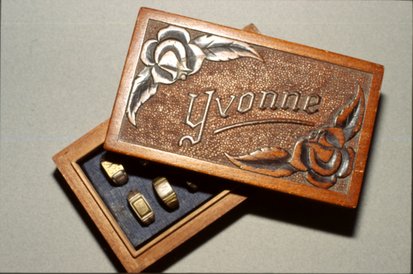Jean-René Vidal (1905-1983)
Jean-René Vidal was born in 1905 in Bazas, Gironde, near Bordeaux, the son of a peasant family. He left school at the age of nine to work as a carpenter. He did his military service in 1925, and married in 1927. His son Roland was born in 1928. Jean-René Vidal was drafted into the French colonial artillery in August 1939, before the German invasion of France in 1940.
On 18 June 1940, German Wehrmacht soldiers captured Jean-René Vidal in Laval, in the north-west of France. From there, in mid-November, he was sent by train via Châlons, Metz and Leipzig to a prisoner of war camp at Fürstenberg (Oder). On 26 November 1940, he arrived at camp 301 of Stalag IIID in Berlin. He was forced to work first for the Berlin water utilities company, then for three years at Berliner brickworks, including as a carpenter. In five years, he was in thirteen different camps all over Berlin.
Jean-René Vidal was one of 20,000 French prisoners of war held in Berlin. They were protected by the Geneva Conventions, with the International Red Cross monitoring their living and working conditions. This protection ended in the autumn of 1943 when the Wehrmacht stripped them of the status of prisoners of war, including Jean-René Vidal, and changed it to that of civilian forced labourers. His working hours were extended and he had to travel to work by public transport. The journey could take up to two hours in each direction because of the heavy bomb damage.
Jean-René Vidal wrote down everything he experienced in notebooks. Almost every day he recorded his 10 to 12 hours of work, six days a week. He described where he had to work, how the labour detachments were transported to work, his accommodation, his contacts with fellow prisoners, his food, his illnesses, his free time, when parcels or letters arrived, how long they took to arrive, what they contained or what he might have wished for. The longer the war went on, the more night air raids he mentioned. In May 1941, he sketched the stations on the city train line he used to travel from his accommodation camp in Grünau to his workplace in Lichtenrade, where his unit was working in a market garden.
By the time he returned from captivity, he had filled eight notebooks with his records. Seven of them are now in the archive of Bordeaux and can be read online.
Liberated by the Red Army in Berlin on 23 April 1945, he returned home to his wife and son on 30 May 1945 after five years of forced labour. When he returned to his home village of Bazas, he had lost a lot of weight because of the poor nutrition of captivity. Until his retirement, he ran a bistro in Bazas and drove a taxi. Jean-René Vidal died in 1983 at the age of 78.
After his death, his son Roland found the diaries and published a slightly abridged version in 2013, first in France as Un pion dans la tourmente. Berlin 40-45 ("A pawn in the turmoil. Berlin 40-45"). The diaries were published in German in 2018.






